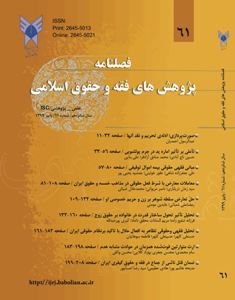ارث متوارثین فوتشده همزمان در حوادث مشابه هدم
محورهای موضوعی : حقوق خصوصیسام محمدی 1 , محسن جعفری بهزاد کلایی 2 * , محسن واثقی 3
1 - دانشیار گروه حقوقخصوصی، دانشگاه مازندران، بابلسر، ایران
2 - استادیار گروه حقوق، دانشگاه پیام نور، ایران
3 - استادیار گروه حقوق، دانشگاه پیام نور، ایران
کلید واژه: ارث, توارث, هدم, تقدم و تأخّر فوت,
چکیده مقاله :
در ماده 873 ق.م. مسأله ارث در خصوص اشخاصی که وارث یکدیگر میباشند اما زمان مرگشان معلوم نبوده و تقدم فوت یکی از آنها مشخص نباشد، بیان گردیده است. ماده مذکور دو استثناء را مطرح نموده و سایرین را که مشمول وضع فوق باشند، از ارث محروم دانستهاست؛ استثنای اول مربوط است به موردیکه فوتشان نتیجه غرق باشد و استثنای دوم در صورت فوت ناشی از هدم. استثناهای مزبور که بر صدر ماده وارد شدهاست، مقتبس از فقه امامیه میباشد. تعارض ظاهری در صدر و ذیل ماده فوق، در آرای قضایی و نیز نظرات علمای حقوق اثرگذار بودهاست. در این مقاله با بررسی مبانی دو حکم عدم توارث و توارث در استثنائات مقرر در این ماده و همچنین دیدگاههای موجود در خصوص تفسیر محدود یا گسترده آن، امکان توارث در حوادث مشابه هدم که شایعتر است، بررسی گردیده و در نهایت با رعایت چارچوب ماده 873 ق.م. و نیز مقتضیات زمان و در جهت حل مشکلات اجتماعی و لحاظ عرف، قائل بهامکان گسترش مصادیق در محدوده مفهوم هدم شدیم.
In Article 873 Civil Law the issue of inheritance has been raised in relation to persons who inherit from each other but whose time of death is unknown and the precedence of death of one of them is not known. The article mentions two exceptions and excludes others who are subject to the above situation from inheritance; the first exception is related to the case where their death is the result of drowning and the second exception is in case of death due to destruction. The above exceptions, which are included at the beginning of the article, are adapted from Imami jurisprudence. The apparent conflict at the beginning and below of the above article has affected the judicial opinions as well as the opinions of legal scholars. In this article, by examining the basics of the two rulings on non-inheritance and inheritance in the exceptions provided in this article, as well as the existing views on its limited or extensive interpretation, the possibility of inheritance in similar incidents, which is more common, has been investigated. And finally, by observing the framework of Article 873 Civil Law and also the requirements of the time and in order to solve social problems and in terms of custom, we considered the possibility of expanding the examples within the scope of the concept of destruction.
_||_
Adl, M. (n.d). Civil law. Tehran. fourth edition.
Ameli, M. (1996). Al-Durus. Qom: Islamic Publications Office affiliated with the Society of Teachers of the Seminary of Qom.
Arabkhazaeli, A. Askari, A. Moradkhani, A. (2017). The use of istishab in civil law by its type. Research in Islamic Jurisprudence and Law. 50, 147-160.
Araki, M. (1996). Principles of jurisprudence. Tehran: Saba Cultural Institute.
Desuqi, M. (n.d.). Hashia Al-Desuqi ala Al-sharh Al-kabir. Dar al-Fikr.
Fazel Lankrani, M. (2001). Al-ahkam Al-vazihah. Qom: Center for the Fiqh of the Imams of the Purification.
Ghazal, H. (2003). Al-miras ala Al-mazaheb Al-arbaah. Beirut: Dar al-Fikr.
Golpayegani, M. (1993). Majma Al-Masa'il .Qom: Dar al-Quran al-Karim. fourth edition.
Hor Al-Ameli, S. (n.d.). Vasael Al-Shiah ela tehsil asanid Al-Sharia. Qom: Al Al-bayt Institute.
Hosseini Al-Ameli, J. (n.d.). Al-Meftah Al-Karama Fi Sharh Qawa'd Al-Allamah. Beirut: Dar Al-Ahya Al-Torath Al-Arabi.
Halabi, A. (1982). Al-Kafi fi al-Fiqh. Isfahan: Amir al-Momenin Public Library.
Heli, H. (1999). Tahrir al-Ahkam. Qom: Imam Sadegh Institute.
Heli, (1967), Izah Al-favaed. Qom: Ismailian Institute.
Heli, Y. (1984). Al-Jame LelSharia. Qom: Sayid al-Shuhada-Al-Elmiya Institute.
Imami, S. (2007). Civil Law. Tehran: Islamic Publications.
Jab'i al-Ameli, Z. (n.d.). Al-Rawdha al-Bahiyya in Sharh al-Loma'a al-Damashqiyah. Qom: Institute of Islamic Enlightenment.
Jab'i al-Ameli, Z. (1992). Masalak al-Afham. Qom: Institute of Islamic Enlightenment. Jafari Langroudi, M. (2005). Inheritance. Tehran: Treasure of Knowledge
Jafari Langroudi, M. (2008). Legal terminology. Tehran: Ganj-e-Danesh Library.
Katouzian, N. (2006). Introductory course in civil law. Tehran: Mizan Publishing.
Khodabakhshi, A. (2011). Legal jurisprudential study of some of the rules of inheritance in traffic accidents. Ahl al-Bayt jurisprudence, 68, 73-131.
Khosravinia, B. (2006). Analysis and criticism of article 873 of the civil code. Specialized Journal of Theology and Law, 19, 97-104.
Khoei, S.(1989). Minhaj Al-Saleheen. Qom: Medina Al-Alam Publishing.
Koleyni, M. (1983). Kafi. Tehran: Islamic Library.
Lotfi, A. (2015). Exceptions to the principle of accident delay regarding the inheritance of the drowned and the dead under the rubble. Knowledge of Civil Law, 7, 1-12.
Moein, M. (1992). Persian dictionary. Tehran: Amir Kabir Publication.
Moslehi Iraqi, A. (2007). Inheritance Law. Tehran: Samt Publications.
Moqadis ardbili, A. (1993). Majma 'al-Fida va al-Burhan. Islamic Publishing Corporation.
Mousavi Al-Khomeini, R. (1997). Tahrir al-Wasile. Qom: Dar al-Alam.
Mughniyeh, M. (2000). Jurisprudence on five religions. Tehran: Tehran Publication.
Najafi, M. (n.d.). Jawahar al-Kalam fi Sharh Sharia al-Islam.
Shahidi, M. (2008). Inheritance. Tehran: Majd Publications.
Sistani, S. (1995). Minhaj Al-Saleheen. Qom: School of Grand Ayatollah Sistani.
Sharbini, M. (1933). Al-moghni Al-nataj ela Al-marefate maani alfaz Al-menhaj. Egypt: Mustafa Al-Babi Al-Halabi Press.
Tabatabaei, S. (1983). Riaz Almasael. Qom: Al Al-bayt Institute.
Tousi, M. (1981). Al-nahaya va kaktaha. Qom: Islamic Publishing Office.
Vahid Khorasani, H. (2007). Minhaj Al-Saleheen. Qom: Imam Baqir School.

